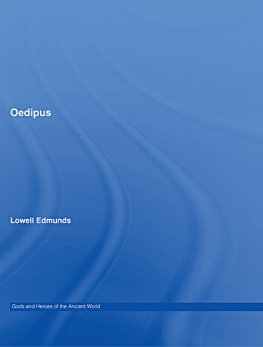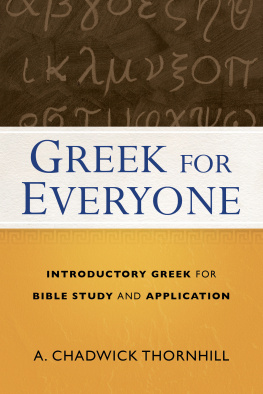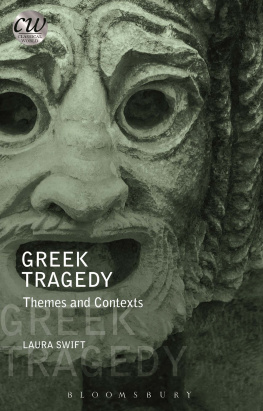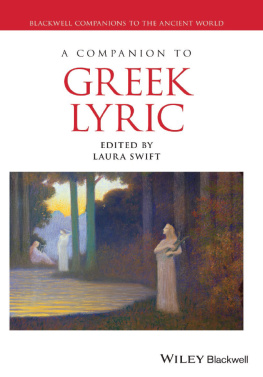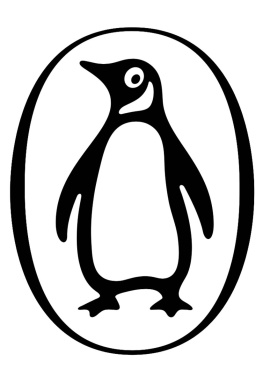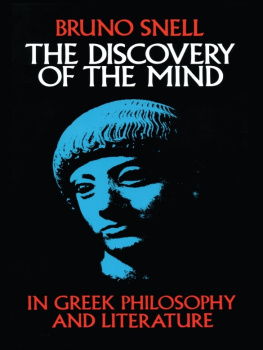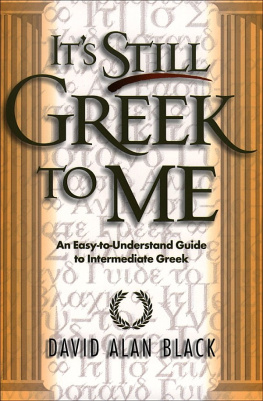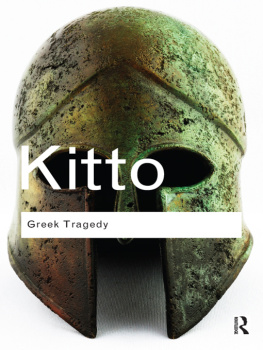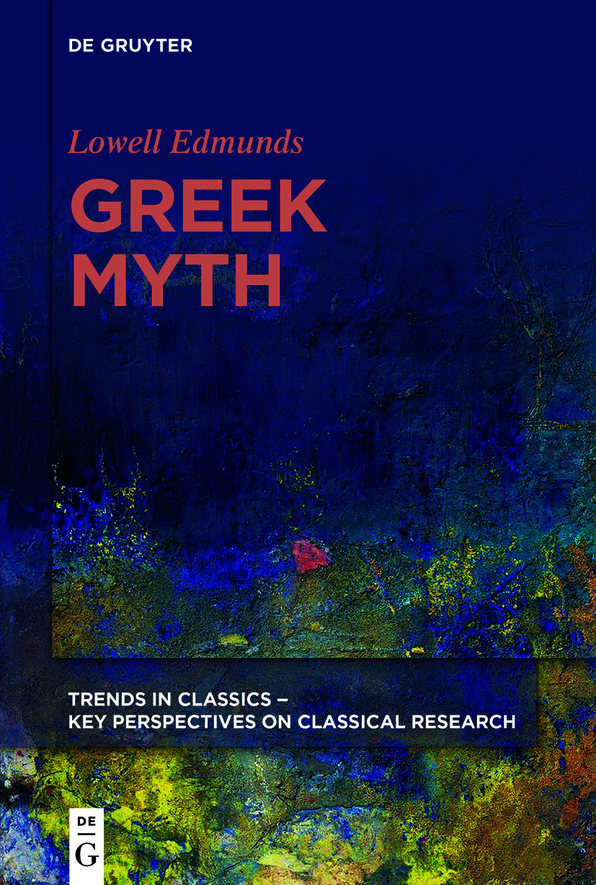Trends in Classics - Key Perspectives on Classical Research
Edited by
P. J. Finglass
S. J. V. Malloch
Christos Tsagalis
Volume
ISBN 9783110682335
e-ISBN (PDF) 9783110696202
e-ISBN (EPUB) 9783110696240
Bibliographic information published by the Deutsche Nationalbibliothek
The Deutsche Nationalbibliothek lists this publication in the Deutsche Nationalbibliografie; detailed bibliographic data are available on the Internet at http://dnb.dnb.de.
2021 Walter de Gruyter GmbH, Berlin/Boston
Lowell Edmunds
Greek Myth
Trends in Classics Key Perspectives on Classical Research
General Editors
Franco Montanari and Antonios Rengakos
Series Editors
P. J. Finglass, S. J. V. Malloch, Christos Tsagalis
Associate Editors
Anna Marmodoro and Elena Isayev
Volume 2
Lowell Edmunds
Greek Myth
De Gruyter
ISBN 978-3-11-068233-5
e-ISBN (PDF) 978-3-11-069620-2
e-ISBN (EPUB) 978-3-11-069624-0
ISSN 2626-1030
Library of Congress Control Number: 2021931471
Bibliographic information published by the Deutsche Nationalbibliothek
The Deutsche Nationalbibliothek lists this publication in the Deutsche Nationalbibliografie; detailed bibliographic data are available on the Internet at http://dnb.dnb.de.
2021 Walter de Gruyter GmbH, Berlin/Boston
Cover image: Domenico Spinosa, Fondo Marino, courtesy of Nicola Spinosa
www.degruyter.com
Preface
In writing this book I have had the benefit of much excellent work on Greek myth, in particular the collections edited by Richard . Most of the articles in these collections, like the five topical chapters in Delattres manual (2005), use reliable formulas for the study of Greek myth. They are: myth in y, where y is Homer or another poet, tragedy, lyric, Alexandrian verse, visual media, or mythography; x in myth, where x is women, history, geography, or any number of smaller-sized subjects, such as dolphins; myth and z, where z is religion, politics, or some other, non-Greek body or bodies of myth, such as Biblical narratives, seen in a comparative perspective.
The author of such an article can rightly assume that everyone will agree that the myth under discussion is a myth. If, however, one asks what a Greek myth is, scholars disagree, as my survey of opinions in the Introduction shows. I argue that the answer to this question depends partly on the sources that one is using. The poets were once primary and perhaps still are. With the turn to mythography in the present generation, a new source claims attention. (I mean the early Greek mythographers and also a second phase, beginning in Alexandrian times and extending down to the early centuries C.E.). Myths in visual media have become sources in a new sense, as independent witnesses to myths, not the reflexes of poetry. My first chapter discusses Theseus in visual media (thus an instance of the myth in y formula) as a large counter-example to the art historians old truism that poetry tends to inspire artistic representation.
As for the question of what a myth is, if it is identified with a poem or a passage in a poem, then the myth is a text to be interpreted like any other text. But a myth and a poem are not the same thing (Introduction, p. XXI n. 24). If, as is often the case, a myth is a common story-pattern drawn from a set of mythemes , classicists have no shared terminology for either story-patterns or basic constituent units nor do they have an agreed upon method for the segmentation that yields the patterns and the units.
Most of my chapters take a position on the topic I am discussing or make an argument. My intention is not to settle the matter, whatever it may be, for the foreseeable future but, in keeping with the goals of the series in which this book appears, to offer a mise au point from which others will continue. For once, an author welcomes a readers or reviewers he was wrong about As for the citation of other scholars, omissions are inevitable. Having written most of this book after the university libraries near me closed in mid-March of 2020, I have a special excuse. (Not everything is available in electronic form.) I also have the usual excuse, especially good in the case of Greek myth, that one cannot cite everything.
I have usually cited translations of books in modern languages, if available, and have put the year of the first publication in brackets, e.g., Calame 2003 [1996]. I have also listed the first publication in Works Cited. My abbreviations of ancient titles and authors names are as in OCD4. For the most part, I use Latin or Latinized transliterations of Greek words and proper names.
For help of various kinds I thank Ruth Barringer, Fiorenza Bevilacqua, William Hansen, Giorgio Ieran, Jordi Pmias, Maria Pretzler, Alan Shapiro, Nereida Villagra, Roger Woodard and, as always and especially, Susan Edmunds. At the end Patrick Finglass and Christos Tsagalis read the whole manuscript and to them I am especially indebted.
Lowell Edmunds
Highland Park, NJ
July 2020
Abbreviations
| ABV | Beazley, J.D. 1956. Attic Black-Figure Vase Painters. Oxford. |
| ANET | Pritchard, James B. 1969. Ancient Near Eastern Texts Relating to the Old Testament. 3rd ed. Princeton, NJ. |
| AT | Aarne, Antti, and Stith Thompson. 1981. The Types of the Folktale: A Classification and Bibliography. 2nd ed. FF Communications 184. Helsinki. |
| ATU | Uther, Hans-Jrg. 2004. The Types of International Folktales: A Classification and Bibliography. 3 vols. FF Communications 284, 285, 286. Helsinki. |
| B | Bernab, Albertus, ed. 1987. Poetarum epicorum Graecorum: testimonia et fragmenta. Leipzig. |
| CGRN | Jan-Mathieu Carbon, Saskia Peels and Vinciane Pirenne-Delforge. 2016- . A Collection of Greek Ritual Norms. Lige. http://cgrn.ulg.ac.be. |
| D DELG | Davies, Malcolm, ed. 1988. Epicorum Graecorum fragmenta. Gttingen. Chantraine, Pierre. 1968. Dictionaire tymologique de la langue grecque: histoire des mots. 2 vols. Paris. |
| D-F D-K | Davies, Malcolm/P.J. Finglass. 2014. Stesichorus: The Poems. Cambridge. [See also F] Diels, Hermann/Walther Kranz. 1952[1903]. 6th ed., rev. Kranz. Die Fragmente der Vorsokratiker. Berlin. |
| EGM | Fowler, Robert L. 20002013. Early Greek Mythography. 2 vols. Oxford. |
| EM | Ranke, Kurt, ed. 1977 . Enzyklopdie des Mrchens: Handwrterbuch zur historischen und vergleichenden Erzhlforschung. 14 vols. Berlin. |
| F | Text and critical apparatus in Davies, Malcolm/P.J. Finglass. 2014. Stesichorus: The Poems. Cambridge. |
| Festa | Festa, Nicolaus. 1902. Palaephati Peri apiston. Teubner. |
| FGrH | Jacoby, Felix. 192359. Die Fragmente der griechischen Historiker. 15 vols. Leiden. |
| Gow-Page | Gow, A.S.F./D.L. Page. 1965. Hellenistic Epigrams: The Greek Anthology. 2 vols. Cambridge. |
| H | Hirschberger, Martina. 2004. Gynaikon Katalogos und Megalai Ehoiai: Ein Kommentar zu den Fragmenten zweier hesiodeischer Epen. Beitrge zur Altertumskunde 198. Munich. |
| HE | Homer Encyclopedia = Finkelberg, Margalit, ed. 2011. The Homer Encyclopedia. 3 vols. Chichester. |


